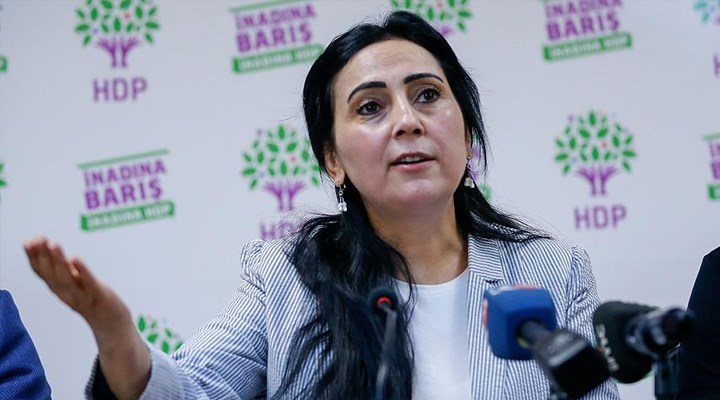Turkey’s Constitutional Court has found rights violations in the conviction of Figen Yüksekdağ, a former co-chairperson of the pro-Kurdish Peoples’ Democratic Party (HDP), in connection with a trial concerning her participation in a 2012 funeral in the southern province of Adana, local media reported on Saturday.
In November 2013 the Adana 7th High Criminal Court sentenced Yüksekdağ to 10 months in prison on charges of spreading terrorist propaganda for participating in 2012 in the funeral of Yasemin Çiftçi, a member of the Marxist-Leninist Communist Party (MLKP) terrorist group, affiliated with the outlawed Kurdistan Workers’ Party (PKK).
Listed as a terrorist organization by Turkey, the EU and the US, the PKK has been waging a decades-long insurgency against the Turkish state that has claimed tens of thousands of lives.
Yüksekdağ’s parliamentary status was removed in February 2017 after the Supreme Court of Appeals upheld the sentence in September 2016, almost a year after she was elected as Van deputy for the HDP in November 2015, after being chosen as the party’s co-chair in 2014.
The top court ruled that Yüksekdağ’s right to freedom of expression as well as the right to be elected and to engage in political activity were violated due to the continuation of the trial after she was elected as a deputy in 2015, which violated her legislative immunity.
Rejecting a request for a retrial, the Constitutional Court unanimously ruled that the former HDP chair’s rights were violated due to the 2016 conviction, ordering the Turkish government to pay her TL 30,000 ($1,724) in damages.
Yüksekdağ is among 108 Kurdish politicians, 28 of whom are currently in jail, along with former HDP co-chair Selahattin Demirtaş, who are standing trial in the Kobani case.
She had been already in jail since November 2016 on terrorism-related charges when a court in November 2019 issued a second warrant for her arrest as part of the Kobani trial.
Thirty-seven people died in violent demonstrations against the Turkish army’s inaction in the face of an Islamic State in Iraq and the Levant (ISIL) offensive against the largely Kurdish northern Syrian town of Kobani in 2014.
Demirtaş had called for street protests in support of Kurdish fighters in Kobani while accusing Ankara of failing to provide adequate help to the town and of supporting ISIL.
The HDP accuses the government of provoking the deaths.
Kobani trial defendants face various charges related to the protests that include 37 counts of homicide and disrupting the unity and territorial integrity of the state.
Yüksekdağ was first arrested along with a number of other Kurdish politicians in November 2016, in a sweeping crackdown on the HDP. Along with Demirtaş, they are facing terrorism charges in several trials, which many say are politically motivated.
Both President Recep Tayyip Erdoğan’s Justice and Development Party (AKP) and its ally, the far-right Nationalist Movement Party (MHP), frequently accuse HDP, the second-largest opposition group in parliament, of ties to the PKK.
The party denies the government’s claim and says it is working to achieve a peaceful solution to Turkey’s so-called Kurdish issue, a term prevalent in Turkey’s public discourse that refers to the demand for equal rights by the country’s Kurdish population and their struggle for recognition.


